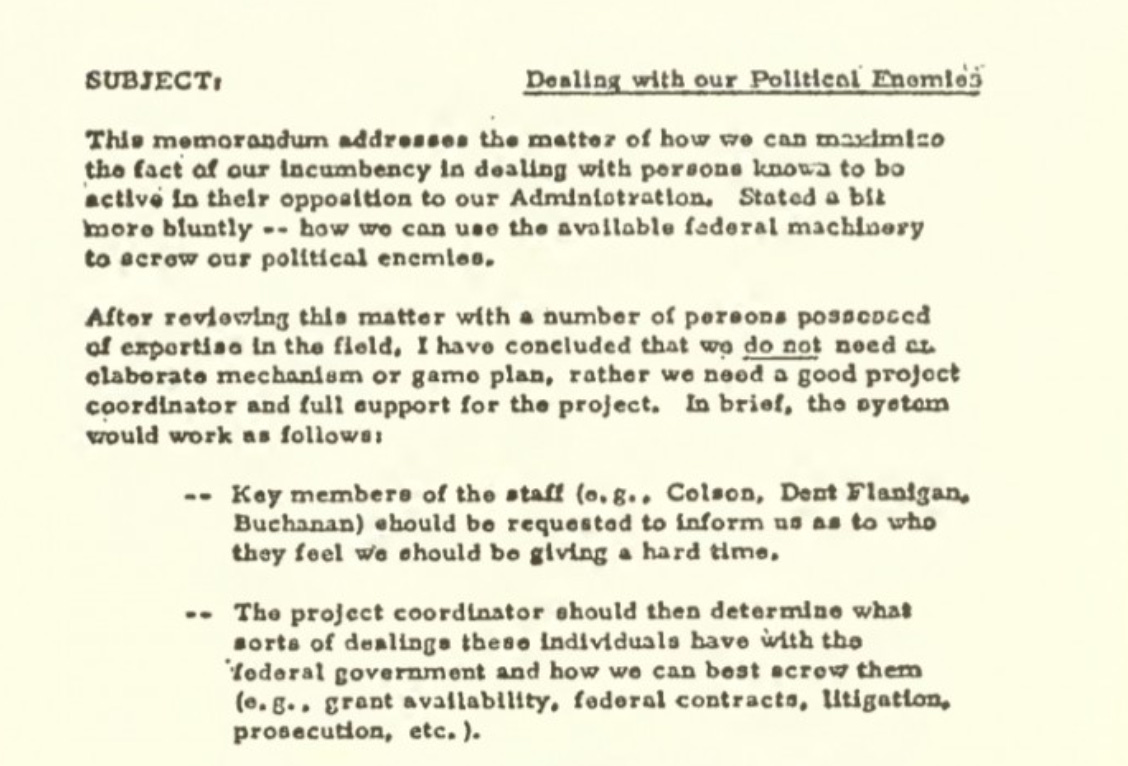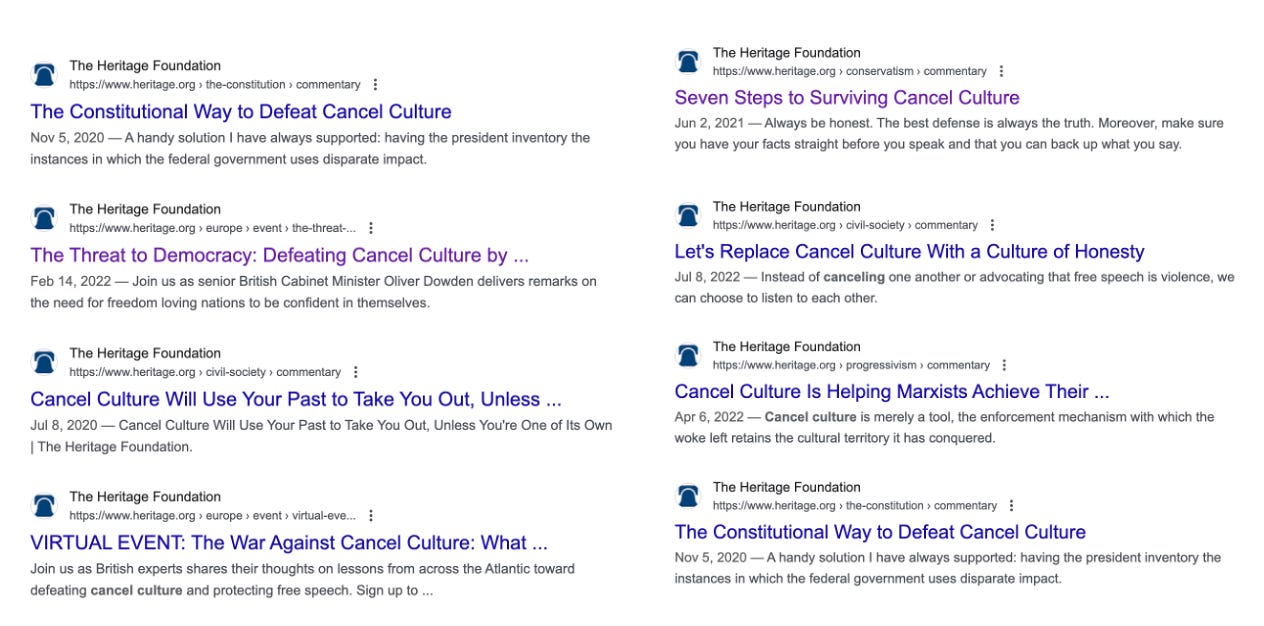Enemies Lists, Then and Now
How open records requests are weaponized by authoritarians
The Trump campaign and the Heritage Foundation are putting together an enemies lists, targeting federal government employees. As a result, many of these employees will be fired by Trump if he returns to office. Some may also fear for their safety as their emails and social media are picked over for signs of disloyalty. Tools of democratic accountability, like Freedom of Information Act requests, are being used to fuel an anti-democratic movement.
The idea of putting anonymous bureaucrats on a public enemies list is not new, of course. Joe McCarthy used the specter of communism to attack public officials. The resulting purges ruined lives. Richard Nixon had his own enemies list. In a memo, Nixon’s White House Counsel John Dean asked “how we can use the available federal machinery to screw our political enemies.” Nixon targeted journalists and celebrities who publicly opposed him. Nixon, like Trump, was also interested in bureaucrats suspected of being disloyal. The “Malek Manual” was an unofficial guide for political appointees about how to screw federal bureaucrats. Civil service rules made firing such officials for clearly political reasons impossible for Nixon, but they could be reassigned to demeaning work or undesirable locations to reduce their influence, or compel them to resign.
The modern far right is even more interested in compiling enemies lists. An ethos of hate justifies extreme consequence. For example, the Claremont Institute’s publication warns that “unpleasant things will have to be done to hold people to account—people who attacked our constitutional republic by refusing to recognize limits on their exercise of power over us.” Jack Posobiec has declared the enemies of Trump to be “un-humans”, using the sort of demonizing language that usually precedes a genocide. He is not an outlier. JD Vance blurbed Posobiec’s book “Unhumans.” Indeed, the idea of purging the bureaucracy seems to be one topic where Vance genuinely feels as Trump does. He has suggested that Trump should “fire every single mid-level bureaucrat, every civil servant in the administrative state.”
The “Slime Machine” Targeting Civil Servants
There is not be a single enemies list of federal employees, but many. Trump loyalists who served with him have a list of civil servants they plan to fire if they return to office.
The Heritage Foundation has also paid political opposition researchers to investigate federal public servants. Tom Jones works leads the American Accountability Foundation, which was created by the Trump-aligned Conservative Partnership Institute. AAF is a tax-exempt nonprofit, and nominally non-partisan. Jones has previously dug up potential dirt on Biden’s political appointees. Heritage gave him $100,000 to find what it called “anti-American bad actors burrowed into the administrative state” by poring over their public and private statements, and publishing dossiers.
Writing about Jones’s “slime machine” in the New Yorker, Jane Meyer had noted its unethical practices. Jones group employs sting operations with fake identities to try to get public officials to incriminate themselves. And he also engages in misleading claims. For example, Jones pushed the claim that Judge Ketanji Brown Jackson was soft on sex offenders, which fueled accusations that she was “pro-pedophile” by some Republican politicians. Brown prevailed, but what will happen to anonymous career public servants that lack the resources provided to a Supreme Court nominee?
Jones also led the attack on Lisa Cook, a federal reserve nominee, sending her personnel records to other economists to ask if she had deserved tenure at her university. Cook also prevailed, but not until after many on the right, such as Tucker Carlson, suggested she was a mediocre economist who was a diversity hire (Cook is Black).
For others, the attacks were too much. Saule Omarova, a law professor from Cornell withdrew from consideration for a position in the Biden administration after Jones’ group falsely accused her of being a secret communist, a claim that was repeated by Republican Senators. (She was born in Russia). As with Cook, Jones emailed Omarova’s colleagues. He asked them “Do you think it is appropriate for the university to provide such a large salary to Dr. Omarova?” while citing an exaggerated number.
Omarova is not alone. Other Biden nominees have withdrawn, or seen their candidacy lose support, after Jones went after them. One said: “People won’t want to serve, because your name will be dragged through the mud.”
Democratic Processes, Authoritarian Ends
Heritage Foundation employees are also using FOIA requests to dig up what they view as damning materials about federal employees. Over the past two years, they have submitted 50,000 information requests, many of which seek specific civil servants emails and texts, and searching for terms such as ‘transgender’, ‘Equity’, ‘Pronouns’, ‘climate change,’ ‘DEI,’ ‘climate equity’, or ‘voting’.
The men behind this are Colin Aamot and Roman Janowski, two columnists for the right-wing Daily Signal who also work for Heritage, and Mike Howell, the Heritage official who declared the 2024 November election to be null and void (if Trump lost) back in July,
The purpose of FOIA, and similar open records laws at the state and local level, is to provide a mechanism of transparency for citizens to understand what is happening inside their government. Their goal of transparency is laudable, but the designers of such laws can hardly have imagined how they would be abused. Indeed, part of the target of the Heritage’s open records request are pro-democratic groups, such as the Election Integrity Research group, or pro-voting groups.
FOIA requests are valuable, but their weaponization has costs. One is the time and effort to respond to 50,000 such requests. A FOIA employee estimated that Heritage was generating a FOIA request per second at times, consuming about a third of their office’s time. “They’re taking time away from FOIA requesters that have legitimate requests. We have to search people’s accounts for poop. This isn’t a thing. I can’t imagine a real reporter putting in a request like that.” (Heritage FOIA requests searched for “Biden” and “mental” or “Alzheimer’s” or “dementia” or “defecate” or “poop”). It is not limited to the federal level. Heritage has encouraged and trained activists to submit open records requests to public schools to seek evidence about culture war topics. Without specialized staff, schools can quickly become overwhelmed.
Heritage has searched for the potential for disparaging comments by public officials, often with little public interest. For example, the search terms include the name of Trump and Kevin Roberts, the President of Heritage, and even the Heritage officials undertaking the search. NASA officials received 192 FOIA requests from Heritage since September, some searching for mentions of Elon Musk. You can imagine how an employee raising concerns about the government relying so extensively on a partisan actor prone to anti-government conspiracy theories, or simply observing that Musk is a douchebag, would be turned into a Twitter-fueled narrative that federal employees are out to get Musk.
Just as an aside: does anyone remember when cancel culture was a thing? A terrible thing! You said something wrong and might get fired? All praise to the Heritage Foundation for delivering us from those terrible days.
The use of FOIA to target and intimidate public employees makes pubic service work less attractive. The practice has already been normalized as a tool for harassing professors who work in state universities subject to open records requests. For example, the tax preparation industry has weaponized FOIA laws to go after professors whose research has exposed their efforts to kill electronic free tax filing. Climate change researchers are particular targeted. Increasingly, so too are disinformation researchers. I contacted Kate Starbird, one of a number of misinformation researchers who has been targeted with open records requests:
It was initially incredibly taxing…None of our messages support the conspiracy theories that motivated the original requests, because we were not communicating with government and social media platforms to remove or otherwise "censor" content, but that has not stopped a few dedicated Substack salesmen and partisan media outlets from selectively featuring and twisting some of messages into their narratives.
At the federal level, FOIA has already been weaponized. What was intended as a tool of transparency has become a means to slow down and even trip up the ability of government to function. A 2017 study found that individuals submitted about 20% of requests, while journalists represented another 7.6%. But the majority of requests came from businesses and law firms that represent them. David Pozen, a Columbia Law professor who studies the topic, has written:
Studies have consistently shown that the bulk of requests come from businesses seeking to further their own commercial interests by learning about competitors, litigation opponents or the regulatory environment…FOIA imposes additional political and agenda-setting costs on agencies by giving those who oppose their work a low-cost tool with which to harass and embarrass them. Businesses and trade groups threatened by a new regulatory or enforcement policy use FOIA to “dig up dirt” on the policy and the people behind it
I asked Pozen about Hertiage’s use of FOIA. He suggested that it represents:
a further weaponization of FOIA, with disturbing implications for government functioning, climate change policy, and more…It may be that what's really new here is the scale of Heritage's efforts
In addition to the scale, the other thing that has changed is the tools Trump would have at his disposal to target individual employees that are placed on his enemies list.
The Tools of Punishment
Trump would have many more tools at his disposal than Joe McCarthy or Nixon.
Schedule F and Permanent Suspensions: Republicans want to strip career civil servants of job protections from political interference. FOIA requests are being used not just to make the work of jobs of employees harder, it will be used to to remove them from those jobs. Here, Trump would use the Schedule F executive order. Trump could also put federal employees on administrative leave, a suspension (with pay), that would put them in limbo.
Investigations: As the old legal adage goes, the process is the punishment. If the DOJ or Inspectors General or supervisors open investigations over alleged wrongdoing, it can drain the financial resources of employees. They may lose security clearances. They are also left with the taint of accusation, even if cleared.
Trump has made clear he will actively encourage such investigations of his political enemies. In his first term, Trump pushed for the investigation and prosecution of many, often without legal justification. This includes Andrew McCabe, who was acting head of the FBI. The investigations fell apart, but McCabe described the effect on his life as profound:
I can’t even describe to you how head-spinning this is to go through this 21-year career — running the FBI at the end of it — and all of a sudden you’re worried about everything. Going to jail, working again, getting bankrupted by attorneys’ fees.
In his first team, some members of Trump’s legal team pushed back against such abuses of power. In a second term, those lawyers will be gone, and Trump will be emboldened by the immunity protections that the Supreme Court handed him this summer.
Public Denunciations: The purpose of the FOIA requests is also to gin up media material. Organizations like Heritage have their own media outlets in the Daily Signal. AAF can rely on friendly outlets like Fox News to air spurious claims. Republicans in government may be anxious to facilitate such media attacks. I wrote recently about how a Republican official who investigated his own employees, and then released the dossiers to friendly reporters. This is not uncommon. Two former FBI officials won large settlements after it was discovered that Trump’s DOJ had leaked their texts as part of Trump’s efforts to remove them.
Few of us know what being the subject of a massive, coordinated attack to destroy your reputation feels like. Omarova, the law school professor who withdrew her nomination to work int he Biden administration, detailed the psychological costs that followed from the public attacks:
Omarova described the confirmation experience as “soul-crushing.” She went on, “You feel stripped down. You feel your house has been destroyed, and you are standing there in front of everyone looking at you, and they have distorted and twisted everything.” She expressed surprise that, in the United States, spurious controversies could be so easily “manufactured out of nothing.” She added, “I’m a naturalized citizen. I put so much effort to be here, and I embraced this country with all my heart. I came from a place that didn’t have freedom of speech or thought. But this made so personally clear to me how fragile our democracy is.”
Intimidation: Simply knowing you are the subject of a FOIA request, or on an enemies list, is itself intimidating. Imagine someone taking a fine tooth comb and going through your e-mail, looking for material they can use to get your fired, or emailing your colleagues to ask what they think about some alleged misdeed.
The fear also extends to those working around you, who are swept up in the fishing expedition. Starbird, the misinformation researcher, noted that a primary concern was protecting students whose names might be exposed.
As such claims are aired, threats inevitably follow, and public officials have to decide if their job is worth the safety of their families.
Defending Democratic Institutions
The use of weaponized FOIA attacks is an example of how anti-democratic actors use democratic values to undermine the institutions they seek to dismantle and control. Which in turn should cause the people who care about those institutions to take stock of how to defend against such attacks.
Even if such fishing expeditions don’t reel anything in, organizations where employees are afraid to be frank in their email communications, or who devote enormous resources to satisfying records requests, are going to be less effective. In describing her experience of voluminous records requests, Starbird compared it to a denial of service attack: she and her organization were so overloaded with requests that they had little time for their core tasks.
As with denial of service attacks, it should be possible for policymakers to distinguish between good faith efforts to understand the inner workings of government, and the spamming of the machinery of government. FIRE, an organization that argues for free speech, and which has itself relied on open records request, notes how their use to target individual faculty can have a chilling effect on campus speech, as well as the type of topics that researchers are willing to study. The parallel in the federal government is a chilling effect on federal employees unwilling to act on the public interest if it conflicts with interests of powerful partisan or corporate actors who will use FOIA to target them, potentially leading to their firing.
FIRE has proposed model legislation that would protect faculty at public universities from overly broad and intrusive open records requests. Pozen, the law school professor who studies FOIA, also suggests that it should be possible to stop the spamming of federal agencies with tens of thousands of requests from an organization whose core goal is to stop those agencies from doing their jobs: “One could imagine ways to limit the use of such tactics: for instance, caps on the number of requests any one party can file or “good faith” requirements meant to block vexatious or repetitive requests.” It is also possible that improvements in AI will reduce some of the burden by improving search processes.
It is worth considering what open records requests should look like, and for Congress to take other actions, such as blocking Schedule F. The scale and range of tools of intimidation and terror at hand won’t be solved by a single action. But it is time for those who care about democratic institutions to see the threats for what they are, and offer a more vigorous defense.
Other stuff!
I am participating in this free online webinar, When Universities are the “Enemy”
If you are interested in administrative burden research:
The annual IRSPM meeting will have a section on burdens. It will be in Bologna, Italy, on April 7-9, and abstract submissions are due October 28.
The White House Burden Reduction Initiative will hold a webinar on what state and local governments can learn on October 24. Register here.






Excellent essay. I had no idea the right had been using FOIA requests for such nefarious purposes. I agree that some limits and restrictions should be placed on these requests. It's similar to the voter challenges and book bans that have been weaponized - go after groups who disagree with you and flood them with requests and challenges to silence them. This is also why laws can get so convoluted. You begin with a relatively simple law and then, because some people abuse the process, the law has to become more complex to deal with the abuse. Another option, for FOIA requests, is to charge a fee for the person making the request when the number of requests exceeds a certain number during any one period (month, quarter, etc.). The fee should be graduated and progressive and help to offset the costs associated with the searches. I signed up for your webinar and I'm looking forward to the discussion.